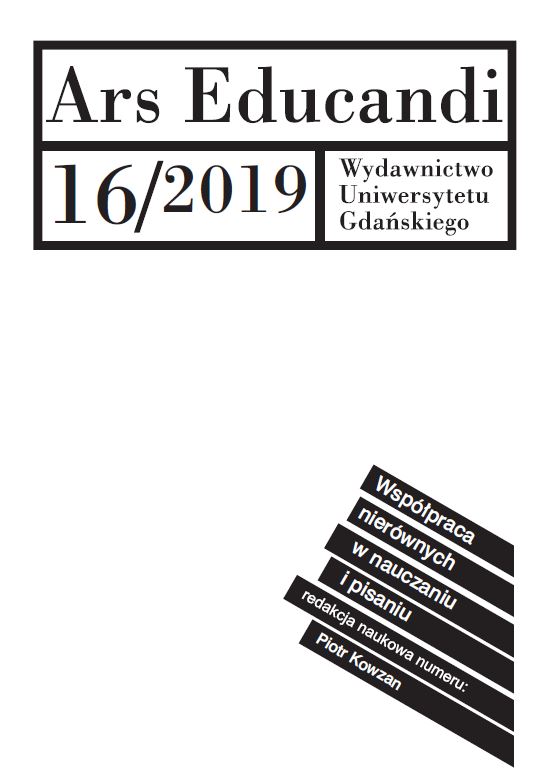Didactics on the stage: Performative autoethnography of students’ and lecturers’ performances
DOI:
https://doi.org/10.26881/ae.2019.16.09Keywords:
autoethnography, voices, higher education, didacticsAbstract
This is a performative text – a record of an autoethnographic performance on academic didactics. We show the dynamics of work during the “Autoethnographies of Study” project. It was a didactic project conducted over several years. Our presentation concerns the most extensive and the most fruitful of its implementations in 2015/2016 (for more see Szwabowski 2019; Szwabowski, Wężniejewska 2017; Kaczmarczyk et al. [in print]). The project used autoethnography both as a teaching tool and as a research method. Students were to become researchers into their academic life. They were to transform themselves from recipients of knowledge into producers.
The following text was presented at a conference on academic didactics. Instead of preparing a typical paper, we decided to show how it was done. Again. Once again. This is one of many stories. Repetition – different again.
The text consists of a description of the process of its creation. Element of proper performance. Finally, we explain once again our position regarding the role of the text/ performances and recall the emotions that accompanied us and the voices that came to us.
Downloads
References
Barr M. (2018) Autoethnography as Pedagogy: Writing the "I' in IR, Qualitative Inquiry, doi: 10.1177/1077800418792940
Blalock A. E. & Akehi M. (2018). Collaborative Autoethnography as a Pathway for Transformative Learning, Journal of Transformative Education 16(2) 89–107.
Boyd D. (2008) Autoethnography as a Tool for Transformative Learning About White Privilege, Journal of Transformative Education 6(3) 212-225.
Ciechowska M. (2017) Autoetnografia w badaniach pedagogicznych [w:] Wybrane metody jakościowe w badaniach pedagogicznych, red. M. Ciechowska, M. Szymańska, Kraków.
Herrmann A. F. (2014). Ghosts, Vampires, Zombie, and Us. The Undead as Autoethographic Bridges, "International Review of Qualitative Research" 7(3), 327-341.
Kubinowski D. (2013) Idiomatyczność, synergia, emergencja. Rozwój badań jakościowych w pedagogice polskiej na przełomie XX i XXI wieku, Lublin.
Lordon F. (2010) Capitalisme, désir et servitude. Marx et Spinoza [Capitalism, desire and servitude. Marx and Spinoza], Paris.
Malewski M. (2010), Od nauczania do uczenia się. O paradygmatycznej zmianie w andragogice, Wrocław.
Saldaña J. (2006). This Is Not a Performance Text, Qualitative Inquiry, 12(6), 1091-1098.
Spry, T. (2001). Performing autoethnography: An embodied methodological praxis, Qualitative Inquiry 7.
Stańczyk P. (2010) Milcząca zgoda, kultura ciszy i polityka głosu, Teraźniejszość – Człowiek –Edukacja 3(51).
Sykes B.E. (2014) Transformative Autoethnography: An Examination of Cultural Identity and its Implications for Learners, Adult Learning, 25(1), 3-10.
Szwabowski O., Wężniejewska P. (2017a) An (co)autoethnographic story about going against the neoliberal didactic machine? , Journal for Critical Education Policy Studies 15(3)
Ulmer J. B. (2017) Critical Qualitative Inquiry Is/as Love, Qualitative Inquiry 23(7), 543-544.
Waite, D. (2014) Teaching the Unteachable: Some Issues of Qualitative Research Pedagogy, Qualitative Inquiry, 20 (3).
Winker I. (2018) Doing Autoethnography: Facing Challenges, Taking Choice, Accepting Responsibilities, Qualitative Inquiry 24(4).

 Academic Scientific Journals
Academic Scientific Journals




